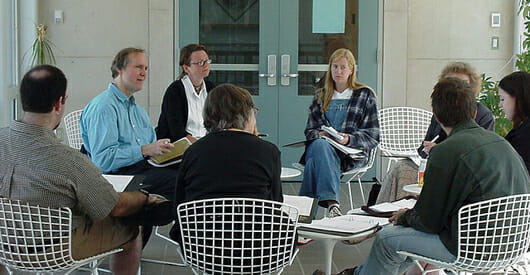
For two years I wrote with a few other writers every Thursday evening. We were taught, and then continued on our own, with the practice of freewriting.
Over the months, it became apparent that to keep out of patterns, to keep our inspiration fresh, we had to use exercises, prompts, ways to shake up our ordinary mind. That mind has great work to do, (I wouldn’t want to do my taxes without it), but it’s out of its element in creativity, and just ruins everything.
No, we needed shocks, new ways to put the same ideas together to yield something fresh. These are some of the ideas that have worked the best for me. Use them. You don’t need a group, you don’t even need another person, although it’s good fun to go off to a coffee shop and write with a friend, or with your wife, for a couple of hours. It’s amazing what you might learn.
These freewriting exercises need a prompt of some kind and a timer. Do 10 minutes to start, everyone beginning and ending together.
10 Writing Exercises to Free Your Mind
- Photos—Each person brings a photo in an envelope. Pass them to the person sitting next to you. At the signal, open your envelope and start writing about the photo. What’s happening in the photo, what the story behind the photo is, what happened before or after the photo was taken. When this session is done, pass them again and repeat.
- Ongoing story—Someone reads the first couple of sentences of a story. It can be from a book, a magazine article, anything really. This is the prompt. Each person completes the story in their 10 minute write.
- Music—Music will defeat the conventional mind because there are no words to hold onto. Play a short piece of music and use it as a prompt. As soon as the signal is given, start writing. It might be how the music made you feel, who wrote it, what it evokes, or the scene for which it is background music.
- Fridge Magnets—If you or someone in your writing group has a set of refrigerator poetry magnets (they are bags of words on magnetic backing you can rearrange to make amusing poems or messages on your refrigerator door) bring them in a sealed bag or can. Each person takes out 5 pieces. At the signal you reveal your words and arrange them in any order. The less sense they make on the surface, the better. This is your prompt. Go for it.
- Random phrase—Use a newspaper or magazine. Close your eyes and touch the paper with your finger. Look at the 3 or 4 or 5 words you’ve touched. This is your prompt. Start writing.
- Alphabetic writing—This is good as a warm-up at the beginning of a session, in 5 minute bursts. Write using the alphabet as a guide. Start with a word beginning with “A” then a word beginning with “B” and so on through the alphabet. Make sentences. You can also do this backwards, but I find it helps to have the alphabet written down so you don’t have to stop to think about it.
- Looking—At the signal look at the place you are writing. Start writing about the place, what you see. Just look and describe. Do it for 10 minutes.
- Listening—Just like Looking, but use only your ears for your stimulus. There is more sound around us than we usually pay attention to. What do these “unheard” sounds remind you of? Go for 10 minutes.
- Alien viewpoint—Pick an inanimate object, an animal, something foreign to who and what you are. A fleck of paint, the chair you’re sitting in. Tell the story of the object, from the object’s point of view. Become the object.
- I remember—This has always been the strongest prompt for me. At the signal, write “I remember . . .” and whatever comes to mind. It could be from your childhood, from the dinner you had tonight, it doesn’t matter. Write until you stop (or the timer goes off). If your thoughts stop, write “I remember . . .” again and start over. Keep going for 10 minutes.
In each case, the idea is to surprise your mind, to knock it out of its ordinary way of operating. Random words, music, nonsense phrases defeat our logical mind, which is incessantly trying to make sense of everything. But not everything is logical, is it? Creativity isn’t logical. Often it isn’t sane, or safe, or staying inside the lines.
In freewriting we want to give permission to the writing mind to go wherever it likes. That’s the crucial thing, to be following it. To be the willing instrument of our own creativity, not some mastermind directing the action.
If we allow the mind to flow freely, even if it doesn’t make sense on the surface, we allow all kinds of new connections, surprising insights, unique arrangements to come into view.
What was the most common phrase in the writing group? “Go for it!”
Happy writing.
Image licensed under a Creative Commons Attribution 3.0 License, original work copyright by aengineer, https://www.flickr.com/photos/aengineer/


